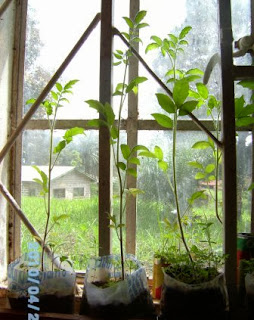 “26% turkey, 20% mechanically separated turkey”; such
percentages on a tin of meat leave a lot to the imagination and the words ‘mechanically
separated’ do little to tempt the taste buds. However, a can of ‘Ye Olde Oak
Turkey Roll’ was the best of a mixed bunch of traditional festive offerings in
the Kenema supermarket. We did splash out on a tin of Danish ham with a slightly
more reassuring meat content of 84%. Once we threw together a few handmade
Christmas decorations and crafted a cardboard tree from an old drinks box, our
festive plans were complete. Whilst there may be many things we shall miss this
Christmas, the simplicity of our preparations and absence of anything
resembling a crowded shopping mall is unquestionably refreshing.
“26% turkey, 20% mechanically separated turkey”; such
percentages on a tin of meat leave a lot to the imagination and the words ‘mechanically
separated’ do little to tempt the taste buds. However, a can of ‘Ye Olde Oak
Turkey Roll’ was the best of a mixed bunch of traditional festive offerings in
the Kenema supermarket. We did splash out on a tin of Danish ham with a slightly
more reassuring meat content of 84%. Once we threw together a few handmade
Christmas decorations and crafted a cardboard tree from an old drinks box, our
festive plans were complete. Whilst there may be many things we shall miss this
Christmas, the simplicity of our preparations and absence of anything
resembling a crowded shopping mall is unquestionably refreshing. 
The hospital has sympathetically quietened a little this
week and we’ve closed the outpatient department from today through to Boxing
Day. Nevertheless, as with any hospital
there are still enough emergencies to keep us in business; unfortunately the increased
number of festive travellers and some dangerous road conditions created due to excessive
dust and gravel on the half -finished Segbwema –Kenema road have combined to result
in a worryingly high number of accidents.
In some ways it has been difficult to get into the festive
spirit, but I felt the Christmas atmosphere arrive last week courtesy of some impromptu
music in the hospital to help calm a nervous patient. A young girl was having a procedure performed
under local anaesthetic in the operating theatre and had started to become increasingly
anxious towards the final stages of her surgery. Fortunately I had my IPod in
my bag and we decided to put on some music to help her relax. After a quick
search for a ‘Merry Xmas’ album, a stillness descended and we all enjoyed a
serene moment of calm and quiet as voices singing ‘Silent Night’ filled the
room.
 I popped down to the TB ward this morning to see Evelyn and
her gang to deliver a food package for the next few days including some fresh
beef from the market. Incidentally, we saw the cow from which the meat came being
led down through town as we sat having a drink at Victor's bar last night. Although
perhaps not quite matured for 21 days, at least we knew it was fresh! (It
appears that I’ve come a long way from my vegetarian years as I certainly
enjoyed the portion of Daisy the cow which we had for our lunch).
I popped down to the TB ward this morning to see Evelyn and
her gang to deliver a food package for the next few days including some fresh
beef from the market. Incidentally, we saw the cow from which the meat came being
led down through town as we sat having a drink at Victor's bar last night. Although
perhaps not quite matured for 21 days, at least we knew it was fresh! (It
appears that I’ve come a long way from my vegetarian years as I certainly
enjoyed the portion of Daisy the cow which we had for our lunch).
After we re-opened the hospital library we set the student
nurses an essay competition on “strategies to reduce the burden of maternal
death in their local community” to encourage them to do some research. Last week we happily began to peruse their entries
and I shall end this Christmas Eve by sharing a few of their words of wisdom.
On the importance of punishing those involved in sex crimes:
“As the saying goes, when the first frog falls into the pit,
the others behind will take caution.” (MS)
On the need to work together on health interventions:
“In order to achieve (a reduction in maternal mortality) there
must be collective cooperation. That is pregnant women, husbands, neighbours, the
youth, the elderly, health workers, drivers and government workers each have a
role to play. Their joint contribution in one way or another will help to save
lives”. (SK)
On the importance of family planning:
“A father should be encouraged to remember that the
community will judge him as much by the health of his children as the number of
his children.” (AM)
Happy Christmas!


























